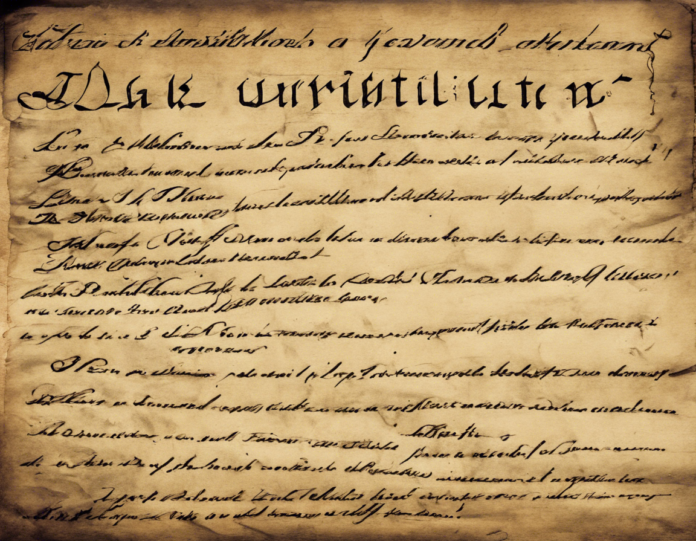A constitution can be defined as a set of fundamental principles or established precedents according to which a state or other organization is governed. It is a crucial document that outlines the structure, functions, powers, and duties of the government as well as the rights and freedoms of the citizens. Whether written or unwritten, a constitution serves as the foundation of a country’s legal and political system. In this article, we will delve into the importance of having a constitution in any society.
The Role of a Constitution
A constitution plays a vital role in any democratic society for several reasons:
1. Protection of Rights
One of the primary functions of a constitution is to protect the rights and freedoms of the citizens. It enshrines fundamental rights such as freedom of speech, the right to a fair trial, and the right to vote. By clearly defining these rights, a constitution provides a framework for the legal system to ensure that individuals are treated fairly and equally under the law.
2. Limiting Government Powers
A constitution establishes the separation of powers between the executive, legislative, and judicial branches of government. It sets out the powers and responsibilities of each branch and creates a system of checks and balances to prevent any one branch from becoming too powerful. This helps to prevent tyranny and abuse of power by the government.
3. Legal Framework
A constitution provides a legal framework for the functioning of the government. It defines the structure of the government, the procedures for making laws, and the mechanisms for enforcing them. This legal framework helps to ensure stability and consistency in the governance of the country.
4. Social Cohesion
A constitution can also help to promote social cohesion by articulating the values and principles that bind a society together. It establishes a common set of norms and beliefs that shape the identity of the nation and provide a sense of unity and community among its citizens.
5. Adaptability and Flexibility
While constitutions are meant to provide a stable foundation for the government, they also need to be adaptable to changing circumstances and evolving needs of society. Amendment processes built into the constitution allow for changes to be made when necessary without completely overhauling the entire system.
Types of Constitutions
Constitutions can be classified into two main types: written and unwritten.
Written Constitution
A written constitution is a single document or a set of documents that are codified into a single source. It is usually entrenched, meaning that it can only be amended or repealed through a special procedure outlined in the constitution itself. Examples of countries with a written constitution include the United States, India, and Germany.
Unwritten Constitution
An unwritten constitution, on the other hand, refers to a collection of laws, traditions, and conventions that together form the constitutional framework of a country. The United Kingdom has an unwritten constitution based on precedent, statute law, and conventions.
Key Components of a Constitution
Regardless of whether a constitution is written or unwritten, it typically includes several key components:
1. Preamble
The preamble of a constitution sets out the goals and objectives of the document. It may also articulate the values and aspirations of the nation.
2. Bill of Rights
A bill of rights enumerates the fundamental rights and freedoms of the citizens, such as the right to free speech, freedom of religion, and the right to a fair trial.
3. Structure of Government
The constitution defines the structure of the government and the powers and responsibilities of each branch, including the executive, legislative, and judicial branches.
4. Amendment Procedures
It also outlines the procedures for amending the constitution to allow for changes to be made when necessary.
5. Distribution of Powers
The constitution establishes the division of powers between different levels of government, such as the federal government and state governments in a federal system.
6. Constitutional Court
Some constitutions create a constitutional court to interpret the constitution and rule on the constitutionality of laws and government actions.
Frequently Asked Questions (FAQs)
1. Why is a constitution important for a country?
A constitution is important for a country as it provides a legal framework for the government, protects the rights of citizens, and establishes a system of checks and balances to prevent abuse of power.
2. What is the difference between a written and unwritten constitution?
A written constitution is a single document that is codified into a single source, while an unwritten constitution consists of laws, traditions, and conventions that together form the constitutional framework of a country.
3. How can a constitution help promote social cohesion?
A constitution can help promote social cohesion by articulating the values and principles that bind a society together, creating a sense of unity and community among its citizens.
4. Can a constitution be amended?
Yes, most constitutions have provisions for amendments to be made to accommodate changes in society and evolving needs. The process for amending a constitution is usually outlined in the document itself.
5. What is the significance of a preamble in a constitution?
The preamble of a constitution sets out the goals and objectives of the document, articulating the values and aspirations of the nation.
In conclusion, a constitution is a fundamental document that serves as the backbone of a country’s legal and political system. It is essential for protecting the rights of citizens, limiting government powers, providing a legal framework for governance, promoting social cohesion, and ensuring adaptability and flexibility in response to changing circumstances. Whether written or unwritten, a constitution plays a crucial role in upholding the rule of law and fostering a democratic society.









